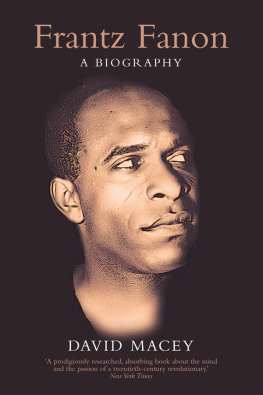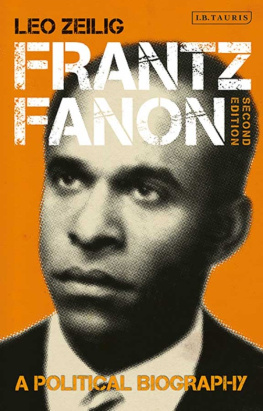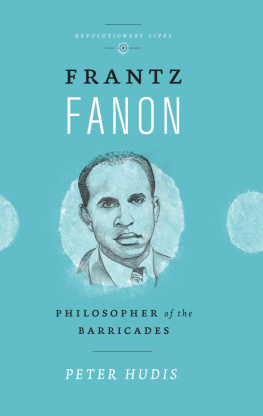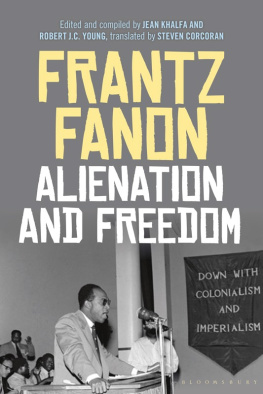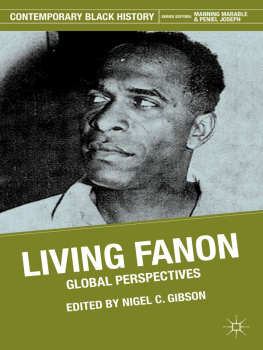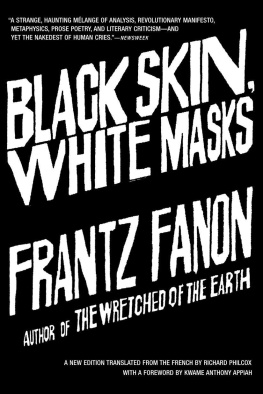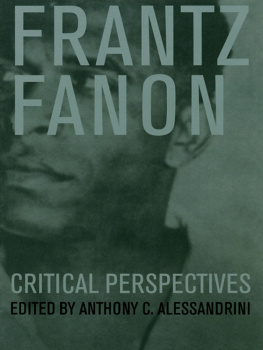
Frantz Fanon
A Biography
DAVID MACEY

For Zak and Marni, and Sophie and Leo... the next generation!
Contents
This study could not have been written without the generous help of many individuals and institutions. My thanks are due to the following: Margaret Atack (as always), Jacques Azoulay, Neil Belton, Robert Berthelier, Bibliothque Mdicale Henri Ey (Paris), Bibliothque Nationale de France, Bibliothque Populaire Frantz Fanon (Rivire-Pilote, Martinique), Bibliothque Publique dInformation (Centre Georges Pompidou, Paris), Brotherton Library (University of Leeds), Centre Culturel Algrien (Paris), Charles Czette, Alice Cherki, Patrick Chamoiseau, Fanny Colonna, Olivier Corpet, Basil Davidson, Thomas Deltombe, Assia Djebar, Jean-Marie Domenach, Edouard Fanon, Joby Fanon, Olivier Fanon, Odette Fresel, Charles Geronimi, Nicole Guillet, Institut Mmoires de lEdition Contemporaine, Marie-Hlne Lotin, Andr Mandouze, Marcel Manville, Mireille Fanon Mends-France, Jacques Postel, Service Historique de lArme de Terre (Chteau de Vincennes).
| AJAAS | Association de la Jeunesse Algrienne pour lAction Sociale |
| ALN | Arme de Libration Nationale |
| BMA | Bataillon de Marche (Antilles) |
| CEE | Comit de Coordination et dExcution |
| CNRA | Conseil National de la Rvolution Algrienne |
| CRS | Compagnies Rpublicaines de Scurit |
| CRUA | Comit Rvolutionnaire pour lUnit et lAction |
| CSP | Comit de Salut Public |
| DCI | Division Coloniale dInfanterie |
| DOM | Dpartement dOutre-Mer |
| DOP | Dispositif Oprationnel de Protection |
| DST | Direction de la Surveillance du Territoire |
| DUP | Dtachement Urbain de Protection |
| FAF | Front de lAlgrie Franaise |
| FIS | Front Islamique de Salut |
| FLN | Front de Libration Nationale |
| FLQ | Front de Libration Qubecoise |
| FRELIMO | Frente de Liberaao de Moambique |
| GPRA | Gouvernement Provisoire de la Rpublique Algrienne |
| MDRM | Mouvement Dmocratique de la Rnovation Malgache |
| MIM | Mouvement Indpendantiste Martiniquais |
| MNA | Mouvement Nationaliste Algrien |
| MPLA | Movimento Popular de Liberaao de Angola |
| MTLD | Mouvement pour le Triomphe des Liberts Dmocratiques |
| NAACP | National Association for the Advancement of Colored People |
| OAS | Organisation Arme Secrte |
| OJAM | Organisation de la Jeunesse Anticolonialiste de la Martinique |
| OS | Organisation Spciale |
| PCA | Parti Communiste Algrien |
| PCF | Parti Communiste Franais |
| PCM | Parti Communiste Martiniquais |
| POLISARIO | Popular Front for the Liberation of Saquia, al Hamra and Ro de Oro |
| PPA | Parti Populaire Algrien |
| PPM | Parti Progressiste Martiniquais |
| RCP | Rgiment de Chasseurs Parachutistes |
| REP | Rgiment Etranger Parachutiste |
| RPC | Rgiment Parachutiste Coloniale |
| RTS | Rgiment de Tirailleurs Sngalais |
| SAS | Sections Administratives Spciales |
| SDECE | Service de Documentation Extrieure et de Contre-Espionnage |
| TAT | Thematic Apperception Test |
| TOM | Territoire dOutre-Mer |
| UNITA | Uniao para la Independencia Total de Angola |
| UPA | Uniao das Populaoes de Angola |
| UPC | Union du Peuple Camerounais |
I cannot recall just why I first read Frantz Fanon. Perhaps it was a recommendation from a friend, perhaps it was the Sartre connection. But I do remember where and when I discovered Fanon. I was twenty and spending a year in Paris as part of a degree course in French. It was a good year and provided an introduction to many things, but it began with a severe culture shock. When I went to the Prfecture de Police on the Ile de la Cit to obtain a temporary residents permit, I saw a group of Algerians all men being turned away from the counter on the grounds they had not filled in their application forms correctly. Individually, they were addressed as tu . To address a friend or relative as tu is to signal intimacy and affection. To address an adult stranger as tu is to insult and humiliate him or her. Collectively, those men were treated with utter contempt by officials who knew a bicot (wog) when they saw one. It transpired that the Algerians simply could not read and write well enough to complete the forms.
To watch anyone being humiliated to recognize the look of hurt in the eyes of the other is distressing. I had rarely seen people looking so forlorn and lost, and I do not think I had ever seen such a naked display of racism. When my turn came to approach the counter, the photograph I tendered was rejected: my hair concealed too much of my face, and I had to have new photographs taken with it pulled back off my face. For a year, I therefore carried a residents permit bearing a photograph in which I was almost unrecognizable. This was a source of amusement rather than humiliation. I was treated brusquely, even rudely, but not with contempt. After all, I was a white European, not a bicot , not a bougnole , not a Mohammed and not a Sidi. In the circumstances, it seemed only natural to at least try to help the Algerians with their application forms. I should have known I could never have been of any great help. Any encounter between undergraduate French and Gallic bureaucratese is always going to be an unequal struggle. I could not speak the language of these men and they could not speak mine. I could not help. I assumed that they were immigrant workers. If and when they did get their papers, they probably helped to build the rapid transport system that exiled most Algerians from central Paris by displacing them to distant suburbs. It was a good moment to encounter Fanon.
Now very battered, my old copies of Les Damns de la terre ( The Wretched of the Earth ) and LAn V de la rvolution algrienne ( Studies in a Dying Colonialism ) were bought in the spring of 1970 from Franois Masperos La Joie de lire bookshop in the rue Saint Svrin. Maspero was Fanons main publisher, and this was where Les Damns de la terre first went on sale in late 1961. It is also where, on the very day that the news of Fanons death reached Paris, copies were seized and taken away by the police because they were deemed seditious. My copies are not first editions but the reprints published in the Petite Collection Maspero edition. Copies of those elegant little books are now quite difficult to find, and the shop where I bought them has gone. The sites of its two branches one on either side of the narrow street are now home to a travel agency and a shop selling posters and cards. The bookshops name meant the joy of reading, and I always find its absence depressing.
The Algerian war had been over for eight years in 1970; almost no one talked about it. It was still impossible for Gillo Pontecorvos Battle of Algiers (made in 1966) to be shown in a French cinema. Plans to screen it in three Parisian cinemas were dropped when their owners were threatened with violence if the screenings went ahead. It was to be almost thirty years before a French government could finally admit that what occurred in Algeria had indeed been a war and not a police operation. No one talked about how, in October 1961, or only two months before Fanons death, the police opened fire on unarmed Algerian demonstrators at the bottom of the boulevard St Michel. No one talked about how Algerians died in the courtyard of the Prfecture de Police. The memory of the student revolt of May 68 had eclipsed that of an earlier generation of twenty-year-olds, some of whom fought and died in a war that had no name, and some of whom refused to fight in it or even deserted from the army. Many of those who deserted, who refused to accept their call-up papers or who even joined the small groups that gave active and clandestine support to the Front de Libration National were inspired to do so by Fanon, the black doctor from Martinique who resigned from his post in a psychiatric hospital in colonial Algeria to join the Front and who preached a gospel of violent revolution.
Next page
